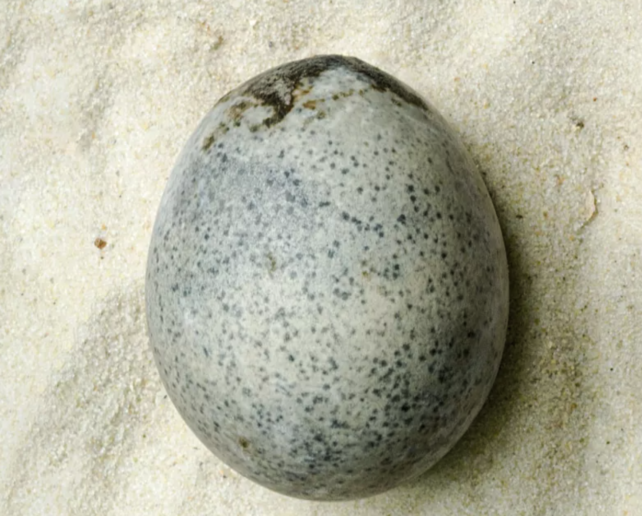ARTICLE AD
An ancient egg laid by a bird roughly 1,700 years ago was discovered in England so well-preserved, its contents are still sloshing around inside of it.
Archaeologists analyzing the Roman-era specimen say they were downright "blown away" by its contents.
The incredible ovum may be the only discovery of its kind in the world. It's certainly the oldest whole egg ever found from Roman times.
While older eggs with intact contents have been excavated in other parts of the world, including ones that were mummified in Egypt, those specimens were intentionally preserved for the future.
This Roman-era egg survived the centuries purely on natural luck. Its shell is now so fragile, it can't be touched or even exposed to air. Scientists must handle it with extreme care.
 The 1,700-year-old intact egg. (Oxford Archaeology)
The 1,700-year-old intact egg. (Oxford Archaeology)The egg's discovery was first announced back in 2019, but it wasn't until recently that conservationists scanned the specimen and realized its insides hadn't leached out of its shell over time, as they expected.
"The egg turned out to be even more amazing," the lead archaeological conservator Dana Goodburn-Brow told The Guardian's Steven Morris.
"It still contained its liquid, the yolk and the white."
From the scans, there are no clear boundaries to differentiate the yolk from the albumen, which suggests the two have mixed together over time. There is also a little air bubble that can be seen between the liquid and shell.
 Micro CT scan of the Roman-era egg shows its liquid in red. (Christopher Dunmore, Imaging Centre for Life Sciences, University of Kent)
Micro CT scan of the Roman-era egg shows its liquid in red. (Christopher Dunmore, Imaging Centre for Life Sciences, University of Kent)Goodburn-Brown told Morris that the investigation was a major highlight of her 40-year career. It is, after all, a potentially once-in-a-lifetime discovery.
The chances of an egg making it this far without human intervention are very low.
Three other eggs found at the same archaeological site did not make it to a museum in one piece. They were accidentally broken by scientists upon analysis, releasing the pungent, sulfurous odor one might expect of 1,700-year-old rotten eggs.
The entire clutch of what are believed to be chicken eggs was unearthed in a waterlogged pit in the town of Aylesbury in southeast England, sometime between 2007 and 2016. The water appears to have protected the eggs from the harsh erosion of drier environments.
frameborder="0″ allow="accelerometer; autoplay; clipboard-write; encrypted-media; gyroscope; picture-in-picture; web-share" allowfullscreen>
Scientists suspect the Roman-era site may have once worked like a wishing well. The eggs could have been meant as spiritual or religious offerings, tossed in for luck, fertility, or funeral rites.
Leather shoes, tools, pottery, coins, and a basket were also found in the pit.
Upon discovering the precious contents of the one surviving egg, researchers transported it to the Natural History Museum in London for further analysis.
A researcher actually took the precious egg on the Tube in what they described as a "daunting" and "bit hairy" experience, according to BBC reporting.
Now that it's safely kept, experts are working to analyze the contents of the egg without breaking it.

 1 year ago
79
1 year ago
79 

